home > articles > The Morality of Hell
By Dr Andrew Corbett
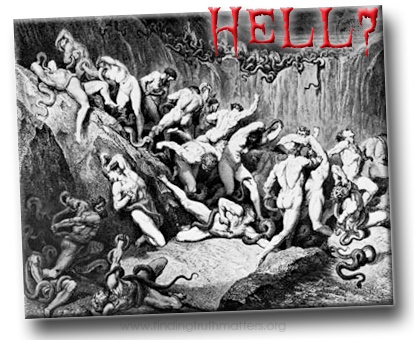 Heaven and Hell are commonly presented as either the benefit or the consequence of how a person responds to God in this life. It’s as if people think that the whole point of religion – and Christianity in particular – is to get people into Heaven and to keep them out of Hell. From this ‘religious’ perspective, Heaven is ultimate bliss, Paradise, a place perfect beauty – while Hell is fire, eternal punishment, anguish, torment, and allegedly – the devil’s domain.
Heaven and Hell are commonly presented as either the benefit or the consequence of how a person responds to God in this life. It’s as if people think that the whole point of religion – and Christianity in particular – is to get people into Heaven and to keep them out of Hell. From this ‘religious’ perspective, Heaven is ultimate bliss, Paradise, a place perfect beauty – while Hell is fire, eternal punishment, anguish, torment, and allegedly – the devil’s domain.
In recent times there has come a lot of push-back regarding the very notion of Hell as it perceived by many. Among Christians who have rejected the classical view of hell are several well-respected writers including John R.W. Stott, and nineteenth fictional writer, George MacDonald. Responding to the resurgence of this idea, Dr Tony Campolo, in his last Evangelical work, “Speaking My Mind”, argued that he was very emotionally drawn to accept the non-existence of hell if it wasn’t for the Scriptures!
Leonard Ravenhill in his book Why Revival Tarries recounts the last moments of Charlie Peace’s life-
He was taken on the death-walk. Before him went the prison chaplain, routinely and sleepily reading some Bible verses. The criminal touched the preacher and asked what he was reading. “The Consolations of Religion,” was the reply.
Charlie Peace was shocked at the way he professionally read about hell. Could a man be so unmoved under the very shadow of the scaffold as to lead a fellow-human there and yet, dry-eyed, read of a pit that has no bottom into which this fellow must fall? Could this preacher believe the words that there is an eternal fire that never consumes its victims, and yet slide over the phrase without a tremor? Is a man human at all who can say with no tears, “You will be eternally dying and yet never know the relief that death brings”?
All this was too much for Charlie Peace. So he preached. Listen to his on-the-eve-of-hell sermon.
“Sir” addressing the preacher, “if I believed what you and the church of God say that you believe, even if England were covered with broken glass from coast to coast, I would walk over it, if need be, on hands and knees and think it worth while living, just to save one soul from an eternal hell like that!”
https://en.wikipedia.org/wiki/Charles_Peace
“We must not ask where Hell is, but how we are to escape it.”
Chrysostom (In Rom., Hom. xxxi, n. 5 in P.G., LX, 674)
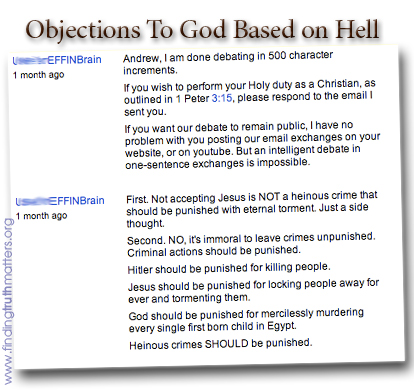
In a YouTube exchange of viewer comments about one of my YouTube videos (not about this topic) the viewer was rather hostile to the notion of a God who would send anyone to hell. But his comments went far beyond what is normally discussed around this issue. Most of the discussion about hell has been about whether it exists and therefore whether Scripture actually teaches it. Those who propose that hell does not exist fall into two general categories:
(i) Annihilationists – those who do not go to Heaven simply cease to exist; and,
(ii) Universalists – everyone goes to Heaven. But this viewer was neither of these.
He had read parts of the Bible and seen that it discusses hell, eternal judgment, and everlasting damnation for some. His objection then was not over hell’s existence or reality but over the morality of a God who would send anyone there. He argued that this made God worse than Stalin, Hitler and Pot combined. After all, he stated, how could a God who sent someone to hell to burn, be tormented, and be punished for eternity for a sin that took no time at all, be considered a loving, kind, worship-worthy God? Like a lot of ‘debates’ which are highly emotive, this YouTube exchange didn’t produce an acceptable outcome for my viewer, but now that the digital dust has settled a little, it might be about time to present a more balanced understanding of the case for the Biblical teaching on hell which is hopefully, if it is actually possible to be so, less emotive.
Since this exchange took place I have noticed a growing disquiet from younger Christian leaders about what the Bible actually teaches about hell. Doing a limited Google search I wasn’t able to readily discover a succinct, yet comprehensive, treatment of this subject. But one is definitely called for, and this meagre attempt may inspire scholars better than myself to make an even more appropriate contribution.
 In Old Testament times the Israelites had an understanding that the souls of the dead went to either of two areas in a spiritual holding place generally referred to as ‘sheol’. One area was referred to as Hades and the other area was referred to Paradise. In Luke 16 Jesus tells the story of the rich man and Lazarus in which He seems to endorse this concept of sheol being a bi-compartmentalised realm since the rich man can see Lazarus in Paradise but cannot cross over because of the impassible chasm between them.
In Old Testament times the Israelites had an understanding that the souls of the dead went to either of two areas in a spiritual holding place generally referred to as ‘sheol’. One area was referred to as Hades and the other area was referred to Paradise. In Luke 16 Jesus tells the story of the rich man and Lazarus in which He seems to endorse this concept of sheol being a bi-compartmentalised realm since the rich man can see Lazarus in Paradise but cannot cross over because of the impassible chasm between them.
Little is said of hell in the Old Testament (just as little is also said of Heaven). We know that the Hebrews lived with a knowledge of-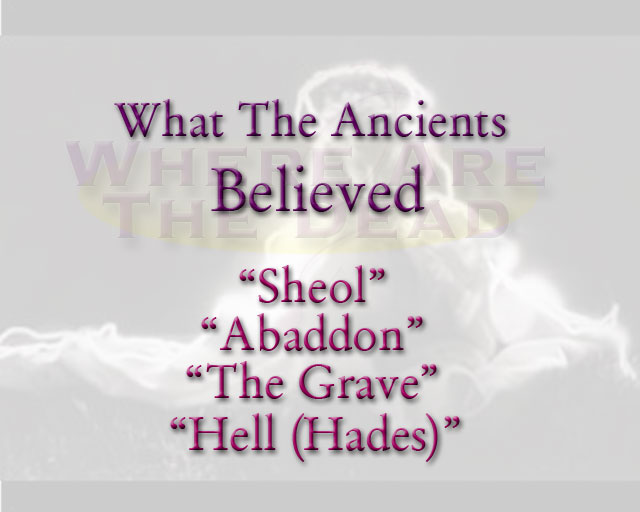
1. The Grave was not the end of human existence. (Job 19:26)
2. God would one day judge all mankind. (Psalm 96:10; 98:9)
3. The righteous would be physically resurrected with an immortal body. (Psalm 16:10)
4. The wicked would be ultimately condemned for eternity. (Psalm 1:6)
Some arguing against the idea of hell have questioned how a loving Heavenly Father could have let His children during the Old Testament times live in ignorance of eternal peril? But the Biblical data from the earliest of times reveals that God must have revealed to the ancients that sin needed to be atoned for. When Adam and the woman sinned, God straightway slew an animal presumably as an atonement. It is highly probable that God revealed why, since in Genesis 4 we have the account of Cain and Abel presenting sacrifices to the Lord. Similarly we read of Noah offering animal sacrifices as well. Hebrews 10:4 teaches us that animal sacrifices were unable to actually atone for sin, and the remainder of the Hebrews chapter reveals that these sacrifices and ceremonies were a shadow of eternal things which would be accomplished by Christ.
In the Book of Job, considered to be one of the oldest Biblical stories, Job had some profound things to say about life after death. In Job 11:20 he states that the wicked will meet their end where they will not see God’s goodness in the next life and will not be able to end their judged state. Much of the Book of Job has to do with why the wicked prosper and the righteous suffer. In Job 36:15-17 he declares that God will ultimately judge so that the afflicted are delivered and the wicked judged. In Job 19:25 Job gives us an outstanding insight into the understanding of the afterlife when he states that God Himself will one day stand on the earth and judge mankind (Job 19:25) and that all people who have died will be resurrected to be judged (Job 19:26).
Hell was considered to be the holding place of the dead and was referred to by various terms through the Old Testament period up until the time of Christ’s first appearing.
Sheol is naked before God,
and Abaddon has no covering.
Job 26:6
 There can be little doubt that Jesus Christ endorsed the belief in hell commonly held by His original audience. Rather than correct their ideas, He added details to it. It’s interesting how Christ spoke about ‘hell’ and about heaven, but this interest should not be confused with the main message of Jesus: The Salvation He was offering with His very life was not merely about escaping hell and securing heaven – it was about being reconciled to the Source of Life, our Heavenly Father.
There can be little doubt that Jesus Christ endorsed the belief in hell commonly held by His original audience. Rather than correct their ideas, He added details to it. It’s interesting how Christ spoke about ‘hell’ and about heaven, but this interest should not be confused with the main message of Jesus: The Salvation He was offering with His very life was not merely about escaping hell and securing heaven – it was about being reconciled to the Source of Life, our Heavenly Father.
Jesus referred to hell in startlingly graphic terms. Even if His audience weren’t yet able to know the treasure and delight in the magnificence of His Father, they should at least know about His Father’s heart to save them from eternal (yet avoidable) torment –
If your right eye causes you to sin, tear it out and throw it away. For it is better that you lose one of your members than that your whole body be thrown into hell [γέενναν “gehenna”].
Matthew 5:29
And do not fear those who kill the body but cannot kill the soul. Rather fear him who can destroy* both soul and body in hell.
Matthew 10:28
[* The NET translators note: While destroy is sometimes taken to mean annihilation, it does not necessarily have to imply that here (“Of eternal death… Mt 10:28, ” BDAG 116 s.v. ἀπόλλυμι 1.a.α). There are some Jewish intertestamental texts that appear to reflect a belief in everlasting punishment for the wicked (Jdt 16:17; 1QS 2:8) as well as Rev 14:11 in the NT.]
Apart from being a place of eternal regret, justice, and deprivation of many of God’s gracious benefits, Jesus introduces His hearers to hell being a place so agonizing that they should do all they can to avoid ending up there for eternity. He describes the fate of those there as eternal destruction, being in everlasting fire, a place filled with composting worms, and outer darkness.

The one who rejects me and does not receive My words has a judge; the word that I have spoken will judge him on the last day.
John 12:48
Christ declared that He would be the Judge on Judgment Day. Full-Preterists argue that such references refer to Christ’s national judgment on Israel. There are numerous problems with this system of interpretation. Firstly, this system demands that all of Christ’s teaching be interpreted as only applicable to the Jews. It assumes that what Christ taught was all under the close of the Old Testament and therefore only relevant to Jews. While certain passages of Christ’s teachings can reasonably be interpreted this way, the context of the New Testament demands that Christ is laying the foundation for the New Covenant and thus what He is teaching is immediately applicable to every non-Jew as well. In fact, if what Christ taught is not applicable to those in the New Covenant then we must wonder what the ethical basis for the New Covenant is?
Secondly, Christ spoke of a “last day” judgment in which all people would be judged (John 6:39-40, 44, 54). Full-Preterists argue that this was fulfilled in the events of AD 70 and only pertained to the Jews. But this interpretation seems impossible since in John 11:24 Martha refers to this “last day” as the day in which all people will be physically resurrected. This did not happen in A.D. 70! Added to this, in John 12:48 it seems that Christ is making a general statement to all of mankind in which He says that He will judge all people.
The word Jesus used most which is translated as ‘Hell’ was: Gehenna. Gehenna was used as Jerusalem’s rubbish dump. It was a valley called the Valley of the Son of Hinnom (Joshua 15:8) referred to in its abbreviated form- Valley of Hinnom. Within the Valley of Hinnom was a part where the rubbish was burned, called Topheth (pronounced: Tophett). In Second Kings 23:9 we read of the Reforming King, Josiah, who ‘defiled’ (“demolished”, MESSAGE Bible) Topheth – “that no one might burn his son or his daughter as an offering to Molech.”
The pagan nations surrounding ancient Israel worshipped the Sun, which they called Molech (or Baal), and the Moon, which they referred to as ‘the Queen of Heaven’ (Jeremiah, 7:18; 44:17), which became known as Astarte or Asherah. These pagan nations believed that these false deities were worshiped with acts of sexual immorality with Temple Prostitutes and the sacrificing of their children by fire. This latter act of extreme wickedness occurred in Topheth, in the Valley of Hinnom. In Second Chronicles 28 we read of the shameful acts of King Ahaz burning his own sons as an act worship to Molech.
and he made offerings in the Valley of the Son of Hinnom and burned his sons as an offering, according to the abominations of the nations whom the LORD drove out before the people of Israel.
Second Chronicles 28:3
Thus, by the time of Christ the wickedness which had become associated with the Valley of Hinnom (in Greek, ge=land + Henna=Hinnom, thus: Gehenna) became synonymous with the Place of the Wicked, or- ‘Hell’.
And they have built the high places of Topheth, which is in the Valley of the Son of Hinnom, to burn their sons and their daughters in the fire, which I did not command, nor did it come into my mind.
Jeremiah 7:31
They built the high places of Baal in the Valley of the Son of Hinnom, to offer up their sons and daughters to Molech, though I did not command them, nor did it enter into my mind, that they should do this abomination, to cause Judah to sin.
Jeremiah 32:35
Jesus used the picture of the wickedness committed at Topheth in the Valley of Hinnom to describe the judgment that would come upon the wicked. He also revealed that it was never God’s original intention to send anyone to Hell.
“Then He will say to those on His left, ‘Depart from me, you cursed, into the eternal fire prepared for the devil and his angels.
Matthew 25:41
Jesus was also clear that the fate of those consigned to Hell was no temporary measure – rather it was an eternal one.
And if your hand or your foot causes you to sin, cut it off and throw it away. It is better for you to enter life crippled or lame than with two hands or two feet to be thrown into the eternal fire.
Matthew 18:8
In Hell (Gehenna, which Jesus also referred to as “Hades”) people who had rejected the eternal life God had offered to them would now reap an eternal ‘life’, better understood as ‘existence’, separated from God. This is what the Bible calls death (to be separated from your life source). It is Biblically incorrect to think of death as ceasing to exist.
but your iniquities have made a separation
between you and your God,
and your sins have hidden his face from you
so that he does not hear.
Isaiah 59:2
For as the body apart from the spirit is dead, so also faith apart from works is dead.
James 2:26
Ultimately, the holding place of the wicked, Hell, will one day itself be translated into the new coming dimension and “be thrown into the lake of fire” (Revelation 20:14).
Then Death and Hades were thrown into the lake of fire. This is the second death, the lake of fire.
Revelation 20:14
This then explains what the Bible means when it talks of a “second death”. This “second death” refers to being separated for eternity from God.
Arguing against degrees of eternal separation as the final judgment, some point to the temporary death of Christ as the payment for sin. If, they claim, the penalty for sin is eternal punishment, then why wasn’t Christ punished eternally for the sins of mankind? Responding to this we note that when Christ was punished for the sins of mankind He wasn’t annihilated and secondly He did indeed go into the eternal dimension separated from His father and then conquered this death. Thus, Christ is referred to in terms of this eternal reality as- “the Lamb slain from the foundation of the world” (Rev. 13:8 NKJV).
In summary –
-
What we now call hell was originally prepared for the devil and his angels (Matt. 25:41)
-
Hell, sheol was the place of all the dead prior to the Cross, with the wicked and the righteous being separated into two compartments. (1Sam. 2:6)
-
That part of hell which held the wicked was the beginning of partial judgment upon them. (Luke 16:23)
-
There was a part of hell where God imprisoned certain angels after they rebelled.(2Pet. 2:4 ¶ “For if God did not spare angels when they sinned, but cast them into hell [tartaroo] and committed them to chains of gloomy darkness to be kept until the judgment;”)
-
When Christ closed the Old Covenant, the righteous in Paradise were about to ascend to the presence of God (heaven). (Eph. 4:8-9)
-
Eventually God will end this world and end hell’s usefulness. It shall be “thrown” into “the Lake of Fire”. Even allowing for the metaphorical language, it paints the picture of a stern warning for us. (Metaphors have teeth!) (Rev. 20:10, 14-15)
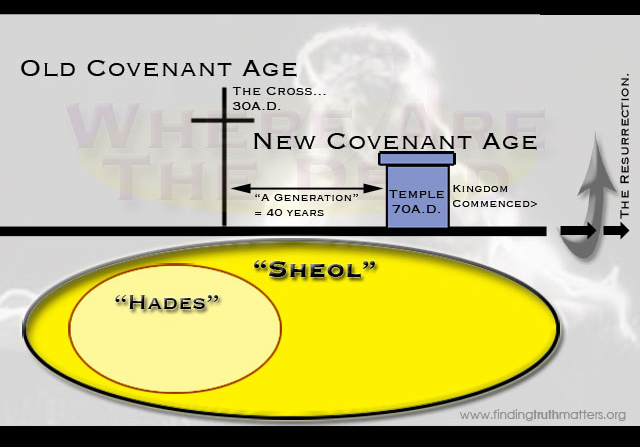
MYTHS ABOUT HELL
-
It is a myth that the devil rules hell – he has never been there, but one day, he will be condemned to “the lake of fire” for eternity.
-
It is a myth that demons torture people in hell. While some of them have already been confined there, they will one day be sentenced to everlasting condemnation.
-
It is a myth that the Church determines who goes there.
-
It is a myth that God will send anyone to hell for failing to believe the “right doctrines.” The unrepentant wicked will experience everlasting condemnation for their rebellion against God and His commands and for their treasonous self-deification.
-
It is a myth that there is a sub-hell or a pre-hell (the idea of Purgatory was a later invention of the Roman Catholic Church. It is a completely unBiblical concept and actually a non-Biblical concept since it teaches that sinners go there to be purged of unrepented sins, when in fact, no-one but Jesus pays for sins).
ALTERNATIVE VIEWS TO HELL
The two most popular alternative views to the classical view of Hell are: (i) Annihilationism, and (ii) Universalism.
ANNIHILATIONISM
Annihilationism is the view that God will not punish the wicked for eternity. Rather, according to Annihilationist view, the wicked will be ‘annihilated’ (that is, they will cease to exist). This is a very emotionally appealing idea which reacts to the idea that a loving, merciful God could punish anyone for eternity (especially since they had only sinned in a moment of time). It is not without apparent Biblical support. Promoters of this view appeal to Scriptural texts which seem to say that God will utterly end the wicked. This language includes: ‘destroyed’, ‘snuffed out’, ‘perish’, ‘burned’. Annihilationists argue that such language does not easily lend itself to perpetual torment.
Of the twelve references to Gehenna that Christ used, many Annihilationists argue, they all related to the pending national judgment about to come upon Israel which was fulfilled in AD 70. In this light they claim that the Gehenna which Christ referred to was literally Gehenna where the Romans literally burned the besieged Jews.
Both of these scenes depict national judgments against a nation persecuting God’s saints, both have judgment scenes, both have people judged out of things written in the books, and both have those not pleasing God in the judgment being cast into a river or lake of fire. This national judgment goes with John’s expressions of imminence in Rev. 1.3 (“the time is at hand”), Rev. 22.6 (“things which must shortly come to pass”), and Rev. 22.10 (“Seal not up the words of the prophecy of this book: for the time is at hand”). Those who take the early date of Revelation (A.D. 67) believe these words refer to the destruction of Jerusalem, while those who take the later date for Revelation (A.D. 90-96) believe these words refer to the destruction of the Roman Empire. Whether they refer to Jerusalem or the Roman empire, they refer to a national judgment.
Samuel G. Dawson, “Jesus Teaching On Hell”, https://gospelthemes.com/hell.htm
This Annihilistic view demands the adoption of Pantellism (the complete fulfilment of all Bible prophecy, also referred to as Hyper-Preterism). It regards all of the Book of Revelation as being fulfilled which naturally requires that Matthew 24-25 must also be fulfilled. All of the judgment passages in the Gospels and the Book of Revelation, they assert, pertain to Israel’s destruction in the first century, not the “end of the world.”
This view of the Gehenna passages has much to commend it. Firstly, it respects the clear time-frame references which Christ gave about the judgment coming upon Israel. Secondly, it questions the introduction of a non-Biblical word (‘Hell’) being forced into the Sacred Text. Thirdly, it presents the final state of the wicked in a way that portrays God as ultimately merciful, since the wicked do not suffer for eternity. Fourthly, Annihilationism makes reconciliation with God the Father through God the Son, Jesus, the centre of the Gospel – rather than “avoiding Hell.”
But Annihilationism has some insurmountable exegetical challenges. Firstly, not every reference to final judgment by Jesus involved the word Gehenna. Christ often spoke of final judgment as ‘eternal fire.’ Annihilationists respond by saying that these references to judgment-fire by Jesus either related to national judgment upon Israel, or ultimately as the end of a soul’s existence. In this sense, they assert, the judgment-fire which Christ spoke of as being ‘eternal’ fire is better understood as ‘unquenchable’ fire. That is, the ultimate judgment (‘fire’) destroying every wicked soul will be sufficient to fulfil God’s judgment upon them.
PROBLEMS WITH ANNIHILATIONISM
But, while it is true that Christ did also speak of the fires of final judgment as being ‘unquenchable’ this is not true in every case.

Secondly, not every reference to Gehenna or judgment upon the wicked can reasonably be made to fit a first-century national judgment. In one reference (Luke 13:28) Jesus said that those who would be thrown into the everlasting judgment would see Abraham, Isaac and Jacob in the Kingdom of God. This is problematic for an Annihilationist viewpoint since presumably the condemned wicked won’t be able to see anything (since they are annihilated). Added to this is the classical-Preterist approach which agrees that much of what Christ spoke of did indeed pertain to His audience within their lifetimes, but that Christ also spoke much beyond this. In classical-Preterism (also known as Partial Preterism) then, Matthew 24 predicted events about to take place (the events leading up to the destruction of Jerusalem) while Matthew 25 uses language that reveals Christ was referring to an additional judgment event at the end of time (note the time-frame change in Matthew 25 from Matthew 24 where each of the parables uses expressions like- ‘delayed’, ‘a long time’). Also, in Matthew 24, the focus of judgment is clearly Israel, but in Matthew 25 the judgment event referred to there is ‘the nations‘. For Pantellism’s (Full Preterism) view of final judgment to fit the Biblical revelation it becomes necessary to redefine the resurrection of the body as a purely spiritual exercise. This would make Paul’s statements in First Corinthians 15 as being nonsensical!
Similarly, Revelation 1-19 parallels Matthew 24 while Revelation 20-22 parallels Matthew 25. As such, Israel’s national judgment can be seen in the events foretold in Revelation’s first 19 chapters, while the destiny of all mankind can be in Revelation 20-22. It’s hard to see how Revelation 20’s description of ‘all the dead’ could fit a A.D. 70 judgment upon Israel.
Thirdly, the Biblical data is usually acknowledged by Annihilationists that all the dead were held in ‘sheol’ within two compartments. Based on the Biblical data, and especially Luke 16 told by Christ, even granted that ultimately God might ‘annihilate’ the wicked, it is acknowledged that the wicked under the Old Covenant were ‘partially’ judged by their containment in ‘hell’ and the testimony of the rich man of Luke 16 was this confinement, and he describes it as, “torment.” Therefore, the argument of Annihilationists that God would never force a person to be tormented for a duration far exceeding the time it took for them to sin seems to be dismissed by at least this data.
Fourthly, the place or locale of final, eternal judgment is a wrong way to think about hell. This ‘place’ is argued to be the literal and physical location at Topheth in the Valley of Hinnom. Yet, Christ spoke in Matthew 25 that this ‘place’ was prepared for the Devil and His angels. Since these beings are non-corporeal (they do not have a physical/material body in the same sense that we humans do) it seems absurd to think that Topheth could be what Christ had in mind (physical fire can not touch a non-physical spirit). Added to this, in Matthew 10, Christ warned His hearers to fear the One who could throw not just their body into ‘hell’ but their ‘soul’ as well. Again, this idea of a physical fire affecting a spiritual body is nonsensical. Thus, the Biblical data points more naturally beyond the visual imagery of the horrors of a literal Gehenna either during the time of the Babylonian or the Roman invasions.
To argue that since Christ has paid the price for the sins of mankind, and He did not endure hell for eternity therefore anyone who does not receive Christ will similarly not have to endure hell for eternity, commits the Justice=A Specific Time Error. Christ’s atonement was not achieved on the length of time Christ endured His suffering, but on His worth as The Sacrifice and the eternal cost of that Sacrifice. He was the only being who could leave this dimension of time in His physical death at Calvary and carry the sins of humanity from past-present-and-future into the dimension of eternity.
Theologically, there is a significant uniqueness about man. Humankind is not eternal but is created immortal (will always exist, cf. Eccles. 12:7; Luke 8:55). Humankind uniquely bears the imago dei (the Image of God). Thus, it would an extreme violation by God to override or destroy the free moral agency of His image bearers if He were to use annihilation to judge the wicked. That is, God honours people’s decisions even if their decision is to reject Him, His love, His forgiveness, or His salvation, even though it has eternal consequences. C.S. Lewis artistically conveys this in his book, The Great Divorce. But for those who have discovered God’s forgiving grace, this revelation magnifies the wonder of that grace.
One of the responses of Annihilationists to Christ’s story in Luke 16, of the rich man and Lazarus, is that this is not about individual judgment. Rather, they assert, it is an allegory meant to indict Israel for their spiritual arrogance. One reader of my original article defended Annihilationism by saying of Luke 16-
In context, Christ’s parable of the rich man and Lazarus seems to have more to do with a reversal of the Jewish monopoly on God (rich man) and the Gentiles (poor man Lazarus) assuming pre-eminence in the age to come (which did indeed happen following the events of AD70) rather than an accurate description of the afterlife.
There are however two immediate problems with this novel interpretation of this text. Firstly, the intention of the story seems to be individual accountability, not national accountability (Christ told other stories where national accountability was clear and obvious, such as the Parable of the Vineyard owner in Matthew 21:33-42). Secondly, Christ’s original audience seems to have understood that Christ was making a point about individual accountability. While not always the best guide for interpreting Scripture, original reception can not be too quickly dismissed. That individual accountability seems to be the primary point about this story is almost universally acknowledged by the vast weight of tradition and commentators.
Curiously, the same respondent also wondered how Christ could have used such a benign concept of hades to ‘redefine’ it as a place of torment. Arguably though, Christ is not redefining a commonly held belief about Hades. Rather, He is reinforcing it!
Annihilationists often argue that hell is an invention of Greek mythology. They point out that many ancient cultures had stories of an afterlife where the wicked went to be tormented for their unrepented sins in this life while the righteous went to a happy rewarded afterlife. This, they claim, is the true source of the doctrine of hell and was embraced by the Roman Catholic Church around the beginning of the Medieval period as a way of using fear to control and convert people.
But Missiologists have long identified aspects of God’s revelation present in a culture before it has been redeemed through the reception of the Gospel. Examples of this might include Zoroaster’s ‘prophecy’ around 600BC about the God of Heaven who would one day incarnate His eternal Son through a 15 year old teenage girl. I wonder how many people reading the opening chapters of Matthew and Luke realise that the “wise men from the east” (“Magi”) were actually Zoroastrians? Zoroaster also claimed that God had shown him that there was a spiritual realm in which fallen angels (“daemons”) battled against good angels. When the exiled Jews in Babylon, and then later under the rule of the Medo-Persians, first heard these accounts they were readily able to synthesize them into their theology to form a more complete understanding of the spiritual realm. Thus, after their return from the Exile we read of ‘Satan’ (1Chron. 21:1; Zech. 3:1) and ‘demons’ (Psalm 106:37) in Scripture.
God’s revelation of spiritual truth to a non-Hebrew culture should be tested for Biblical compatibility before it is dismissed out-of-hand. It is certainly true that many ancient cultures had a limited understanding of spiritual truths which had eventually developed into a set of myths. These stories include the creation of the first man and woman, a devastating flood, and the origin of evil caused by a once-good but now evil being who opposed God. Therefore, it’s not surprising that if hell was indeed created for judgment upon Satan and his horde (Mtt. 25:41) that there would be some residual general revelation evident within ancient cultures. This is certainly the case with the traditional understanding of hell outside of the Bible.
UNIVERSALISM
Universalism is the idea that when Christ died, He saved everyone whether they accept Him or not. Thus, Universalists claim this is why none of the apostles ever mentioned Hell in their preaching-
The Book of Acts contains the record of the apostolic preaching, and the history of the first planting of the church among the Jews and Gentiles, and embraces a period of thirty years from the ascension of Christ. In all this history, in all this preaching of the disciples and apostles of Jesus there is no mention of Gehenna. In thirty years of missionary effort these men of God, addressing people of all characters and nations never under any circumstances threaten them with the torments of Gehenna or allude to it in the most distant manner! In the face of such a fact as this can any man believe that Gehenna signifies endless punishment and that this is part of divine revelation, a part of the Gospel message to the world? These considerations show how impossible it is to establish the doctrine in review on the word Gehenna. All the facts are against the supposition that the term was used by Christ or his disciples in the sense of endless punishment. There is not the least hint of any such meaning attached to it, nor the slightest preparatory notice that any such new revelation was to be looked for in this old familiar word.”
J. W. Hanson, D.D., The Bible Hell, fourth edition, Boston: Universalist Publishing House, 1888. Available online
Universalists reject the idea that anyone will be subject to endless torment for their sins. Therefore, they assert, there is no eternal Hell-
Salvation is never said to be from Gehenna. Gehenna is never said to be of endless duration nor spoken of as destined to last forever, so that even admitting the popular ideas of its existence after death it gives no support to the idea of endless torment.
J. W. Hanson, D.D., The Bible Hell, fourth edition, Boston: Universalist Publishing House, 1888. Available online
PROBLEMS WITH UNIVERSALISM
It seems then that if we could dismiss the soteriological claims made by Universalists then their understanding about Hell will be seriously undermined. Does God impose His will upon His free moral agents (mankind)? That is, what if someone utterly rejected God and everything He was? Would God respect this choice or ignore it? I’m a Moderate Calvinist, but not even Hyper-Calvinists claim that God disrespects a person’s free choice. Secondly, those Scriptures which seem to support Universalism, in their context, don’t. Rather, the context reveals that salvation is available to anyone, but not everyone will accept it.
¶ Therefore, as one trespass led to condemnation for all men, so one act of righteousness leads to justification and life for all men.
Romans 5:18
Romans 5:18 is a classic supporting text for Universalism. After all, it states clearly that Christ’s atonement brings justification to “all men”. But notice the context-
¶ But the free gift is not like the trespass. For if many died through one man’s trespass, much more have the grace of God and the free gift by the grace of that one man Jesus Christ abounded for many.
Romans 5:15
The free gift is not like the trespass. The trespass of Adam had affected the entire of mankind but the gift of God (salvation) has come to “many.” The salvation which God offers while being universally available will not be universally accepted.
If, because of one man’s trespass, death reigned through that one man, much more will those who receive the abundance of grace and the free gift of righteousness reign in life through the one man Jesus Christ.
Romans 5:17
Salvation is for those who “will…receive the abundance of grace…” In the next chapter of Romans, Paul states that the wages of sin is death. Biblically, death is not ceasing to exist, but rather being separated from a life source. (In James 2:26 it refers to the body being dead when it is separated from its spirit.) This reference to death by Paul is taken to be the same as the death spoken of in Revelation 20:6 which is called “the second death.” Revelation 20 continues on to describe the destiny of those subject to the second-death as ultimately being subjected to eternal torment. Revelation 20:13 describes the wicked being evaluated for how much they will be judged for eternity. This presents a problem for the Annihilationist who insists that all the wicked are equally destroyed (so why the need for judgment at all?) and a significant problem for the Universalist who reasons that there will be no judgment at all.

‘Hell’ like any word, is merely a label for a concept. The concept of the wicked being separated from God for eternity and having to endure that torment is an emotionally difficult one. I am sympathetic to both Annihilationism and Universalism but I can accept neither because of the overall revelation of Scripture. The Jews had developed a concept of the righteous enjoying God for eternity while the wicked would be tormented for eternity. Jesus did little or nothing to correct this concept. In fact, based on His Luke 16 story it appears that He built upon it!
and in Hades, being in torment, he lifted up his eyes and saw Abraham far off and Lazarus at his side…for I have five brothers—so that he may warn them, lest they also come into this place of torment.’
Luke 16:23, 28
While it might be true that some of the Gehenna references made by Christ found their immediate application in the judgment upon Israel in the first century, it is difficult to see how they all were. Added to this, ‘Gehenna”‘is not the only term used by Christ to speak of final judgment and the other terms and expressions encompass much more than the nation of Israel.
and the devil who had deceived them was thrown into the lake of fire and sulphur where the beast and the false prophet were, and they will be tormented day and night forever and ever…Then Death and Hades were thrown into the lake of fire. This is the second death, the lake of fire.
And if anyone’s name was not found written in the book of life, he was thrown into the lake of fire.
Revelation 20:10, 14-15
But how could a loving, merciful God condemn someone to everlasting torment for sins committed over a very finite time? Isn’t “everlasting” out of all proportion for sins committed over a relatively short life-time? But this question makes a faulty assumption: that the length of time taken to commit to a sin is in some way commensurate with the time required to mete out justice for these sins. But we don’t apply this logic to any other occasion for justice. For example, it might take just a few seconds to commit murder – but no one would seriously think that it would be just if the murderer was only punished for the duration of time it took to commit the crime. It is the gravity of the crime (or sin) which determines the duration of the justice required. Therefore it is just and reasonable to sentence the wicked to be banished from God’s presence for eternity due to the severity of their sin.
Is it moral for God to separate the wicked from His presence for eternity and for the wicked to then have to endure this for eternity? Since God is the Creator it seems that He is entirely justified in doing so. The basis for this damnation will not be a theology test, or which religious club you belong to, but rather whether you have restored God to His rightful place in your life. The wonderful news of the Bible is that God has done all He can to ensure that no-one has to go to eternal damnation. It might be arguable to that it would have been immoral for God to condemn anyone to eternal damnation without at least giving them a chance to be redeemed. But since He has, and continues to do so, even this tenuous claim must be dismissed.
If you do not have peace with God in this life you will not find it in the next. But if you do find peace with God in this life by acknowledging Him as your Creator, Redeemer, Saviour and Lord, then you can have the assurance that He would never separate you from His eternal love and life. But it is my hope that your motive for turning to God is not merely to avoid Hell and not even to merely be prepared for Heaven, but to be reconciled to God from whom all purpose, delight, joy, and satisfaction comes.
Universalism’s “Gospel” does not warn men to flee the eternal wrath to come. In fact, it doesn’t even invite people to be “saved” since it’s basic tenet is that all people already are- they just don’t know it. This is why most Universalists are left with a Gospel that is filleted to a “social” Gospel concerned with the injustices of society such as poverty.
IS IT MORAL FOR GOD TO CONDEMN FOR ETERNITY?
Of the classic apologetic arguments for God (The Cosmological Argument; The Teleological Argument; The Ontological Argument; The Moral Argument; and, The Christological Argument – which I have written a separate eBook about), many scholars regard the Moral Argument as the most compelling. This argument might be stated this way-
1. Objective Morality requires an Objective Source which can only be God
2. Morality exists.
3. Therefore, God exists
To defeat this argument it is necessary to show that God is not moral. This is what my YouTube respondent was attempting to do. His strategy for attempting to do this was to acknowledge what neither Annihilationists or Universalists are prepared to do – that the overwhelming Biblical revelation about Ultimate Judgment is that God will condemn the wicked for eternity to their own torment – but because God will do this, He is supposedly a cruel, maniacal, vindictive, and immoral God.
I have responded to these charges within this document because it is also the tacit foundation of both Annihilationists and Universalists as well. Since God is the Creator, He is perfectly moral in, in fact He is obligated to be, judging His creation however He chooses. Secondly, the duration of the sin for which people will be judged is irrelevant to the period of justice meted out – in the same way that a murderer is not punished for a commensurate period to the duration of time it took to commit the murder.
Arguing against the Biblical God on the basis of immorality seems self-defeating. After all, if there is no God can there be any objective morality? No. Therefore, acknowledging that God will indeed judge people and condemn them for their wilful rebellion and self-deifying cosmic treason by confining them to what we call “hell”, He is exercising a moral prerogative. Arguably, if He didn’t do this it could be argued that He was actually immoral since He would be ignoring people’s immorality instead acting morally by bringing justice.
HAVE WE ALL UNDERESTIMATED SOMETHING?
In dismissing God’s eternal judgment upon a rebel, I wonder whether we are also underestimating the vileness of sin? Unless we understand how serious sin is, we will never understand why it must be atoned for with an infinitely valuable sacrifice. Unless we understand how devastating sin is we will never appreciate that we deserve nothing from God except His wrath and that if He has elected us to salvation the only reasonable response is gratitude. Left to ourselves, in our sinful condition, none of us would desire God’s will for our lives!
“Were it not that God had chosen some,
heaven would have none.”
D. J. Ward
Jesus Christ was the slain Lamb of God who died for those chosen from the foundation of the world to be saved (Rev. 13:8). He paid the ultimate price for the ultimate act of rebellion. It is a complete misnomer to think that any sinner could even begin to pay an infinite debt to an infinite God. This is why it is wrong to think of Hell as the place where sinners are sent to “pay for their sins”. They are not. Rather, they are sent there because of their sins. This is why we must reject the Roman Catholic notion of ‘Purgatory’ which nowhere occurs in the teaching of Scripture, since no man can have his sin dealt with merely through purging.
Sin is a declaration of self-deification. It is rebellion of the first order. It says to the Creator and Judge of the World, “My will be done!”
“There are only two kinds of people in the end: those who say to God, ‘Thy will be done,’ and those to whom God says, in the end, ‘Thy will be done.’”
C. S. Lewis
The Reformers referred to the sin-defiled natures of mankind as “total depravity”. This didn’t mean that everything people did was devoid of any dignity, nobility, or charity. It did however mean that compared to the standard of goodness set by God, no person could ever hope to come close. Jesus refers to this same idea when He said, “Blessed are the poor in the spirit”. Christ was conveying an idea of spiritual poverty that went so far beyond bankruptcy, that even given a thousand lifetimes of earnings, the debtor could not even pay off 1% of 1% of their debt- so large is their debt. “Blessed” are those who recognise their dire condition before God. Even more blessed are those who cry out to God and ask for Him to forgive them their debt!
While it is true that epistles of the New Testament don’t refer to “Hell”, this is only half true because they do refer to the imagery of fiery judgment. The Apostles did preach “Judgment”. Judgment to the Universalist only refers to the nation of Israel and is therefore not applicable to anyone today. Judgment to the Annihilationist is pointless because all the wicked are immediately destroyed in the next life. But there is a Judgment coming. This is what the Apostles preached and the Epistles warned. There are degrees of sin committed by sinners to which the Judge will judge justly. Thus, for all the atrocities committed by the likes of Adolph Hitler and company, the Judge of the Cosmos will ensure that justice is carried out. For the Universalist, Hitler will be saved to spend eternity in Heaven along side the likes of Dietrich Bonhoeffer who died as a godly, Christian martyr. For the Annihilationist, Hitler’s fate will be to die in the arms of his lover and then have his soul vanish. The Apostles would have none of this! For them, such sinners would stand before the Judge and be judged. This would ensure appropriate justice. Rather than this being a disturbing doctrine, it should bring great relief and comfort for those who have been affected by the injustices of this life where no human court or authority has been able or willing to ensure that true justice has been carried out.
It is a myth to think that people will be tormented forever in a God-separated eternity simple because they refused to become a Christian. This is a “straw man” argument set up by opponents of the doctrine of eternal judgment. Eternal judgment (not “damnation”) will be carried out on all those who wilfully rejected God’s claim over them and instead committed the heinous sin of self-deification (determining for themselves how they would live and who they would heed). So deceitful is the ravaging destruction of sin on a person that it corrupts their entire thinking and outlook. Thank God, that in His grace He has chosen to elect “many” to be the recipients of His grace and extends to all the offer of salvation from sin, judgment and eternal lostness.
—
As Chrysostom said, the point about hell is not to argue it away or even to learn more about it, but to do all we can to avoid it. And avoid it we can! God has done all He can possibly do to keep people out of a place which was never prepared for the souls of people, but for the Devil and his fellow angelic rebels. For those who cry out to God for salvation in order to eternally avoid hell they will discover the most delightful shock of their lives: salvation is not primarily about avoiding hell and going to heaven, but about being reconciled to, adopted by, and blessed with, God Himself.
Dr. Andrew Corbett
3 Comments
Submit a Comment
-
Sale!

5 Things We Need To Do To Break Our Church’s 200 Barrier, Premium Audio
$0.95 -
Sale!

A Morning With Izaak Walton – The Compleat Man, Premium Audio
$1.25 -
Sale!
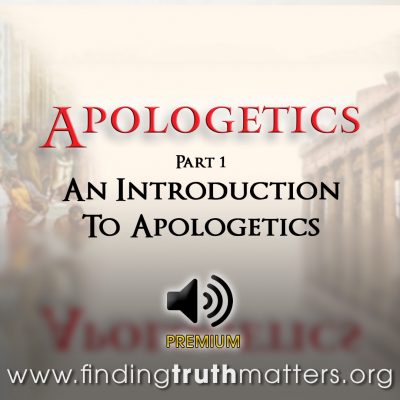
Apologetics Part 1 – Introduction To Apologetics, Premium Audio
$0.95 -
Sale!
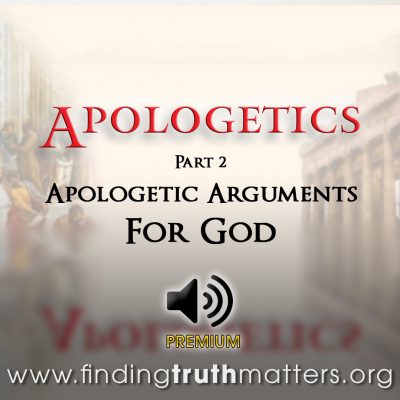
Apologetics Part 2 – The Apologetic Arguments For God, Premium Audio
$0.95


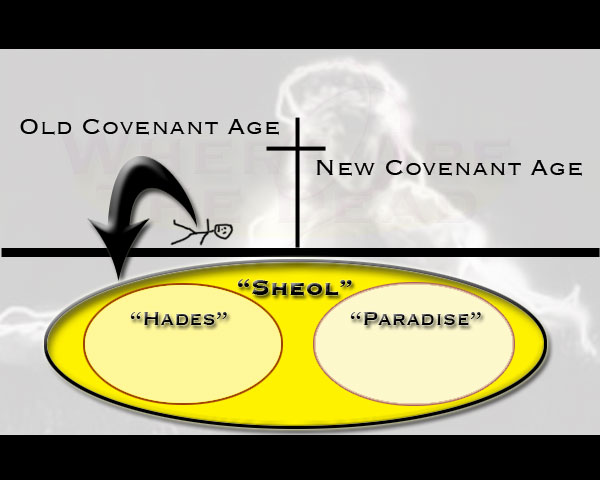 >
>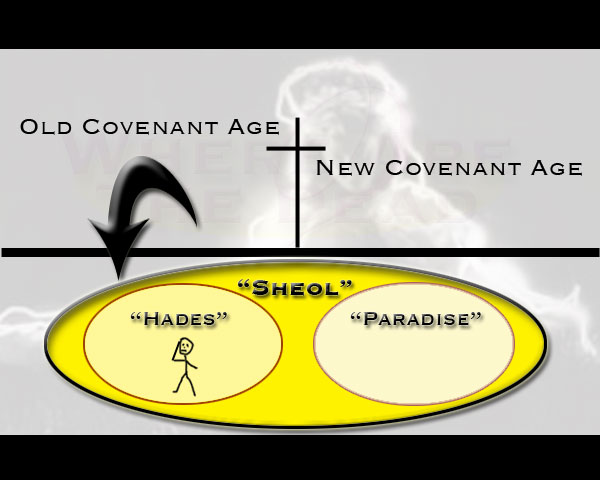
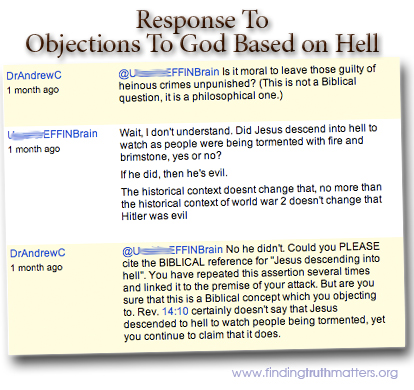





































You are still not addressing proportion. The person who murders took as much time as the one who shoplifted some bubblegum.
Both of them sinned, however, forcing God to hate them with their sins, and since God only shows himself once we die to judge us after letting us sin not knowing his full glory, the two experience the same damnation for dying in sin. Both are sentenced to be tormented for eternity with no possibility of being redeemed, purged, or euthanized.
There is, by definition, no proportion to the crime: infinity is infinity is infinity is infinity is infinity is infinity. There is no uttermost farthing, and there will never be.
So remains the sin unforgiven, and still real. God can’t or won’t destroy it, but only quarantine and contain it. He doesn’t burn sin by his presence, but must throw it out lest it infect him. The devil has won, proved God to have failed. Sin is able to control God.
You then used straw-man arguments against Annihilation and Universalism as well by pretending that their time in hell is painless or they don’t go to hell at all. Who says having your soul destroyed, i.e. annihilated in hellfire is painless when it hurts your body to touch earthly fire? Who says God will purge your evils in the refinery of hell with anesthetics and pillows?
The idea that hell is eternal life in torment, fully embraced in the 4th Century, makes it the center of the gospel. When confronted with this, nothing, absolutely nothing else matters. God is only a means to escape it. Jesus is the means to escape it. Anything is the means to escape it. Nobody loves for love’s sake when they have their belief in hell at mind. Nobody wants to be close to God who prepared it, claims to have made it for the devil, but eternally ordains some to go there. God is never the objective. The whole and only point is getting to heaven. God will be the last thing you want to see. The point of coming to Jesus is to force the Father not to torture them.
After all, God created sin by proxy, but evades responsibility for it by fiat. He made us in the womb (Psalm 139) and we are born sinners (Psalm 51), without the ability to not sin, imputing our flaws from Adam and then cindemning us for being weak and imperfect (Romans) as he created us, and sentencing us to hell for it. He even regrets making us (Genesis 6) but tells us to multiply and create more sinners (Genesis 9).
God is, in the end, more holy than he is loving. The Gospel is about hiding behind Jesus so the Father won’t see us.
Hi Gordon, thank you for sharing your opinion on this topic. You’re right, there are degrees of sin and degrees of appropriate judgment since Jesus described some heinous sins as “greater sin” (John 19:11 for example). Annihilationism and Universalism do not subscribe to a doctrine involving hell.
The Gospel is not merely about hiding from God. It is about exchanging our sinfulness for Christ’s righteousness whereby we are forgiven, justified, and adopted by God the Father, because of Christ’s atonement, resurrection and ascension.
There can’t be a real difference in degree of punishment for the damned; only for the saved who are judged at the Judgement Seat of repaying of worthless deeds, instead of the White Throne, where the slightest lapse warrants eternal torture.
No doctrine? Haven’t you heard about the Millerites? There are as many wishful doctrines in annihilationisn as there are infernalism. We infernalists debate all the time: is the fire physical or metaphorical? Internal or external?
Not all of those alternative theories pretend there is no judgement. They just like to pretend that the damned actually die or are actually permanently chastized (put out of their misery) instead of eternally sustained by God’s hand (1 Timothy 6:16) in torment.
As for the rest, you’re saying exactly what I’m saying, but omitting the rest of the story. We must preach the whole gospel without omission: We exchange our sinfulness that we were created with, to be forgiven for what we can’t help, because the debt that God saddles us with for sin cannot be paid out by us. We after Adam were made infinitely capable of offending God, but completely unable to please him. We are justified so as to avoid the sentence that the Judge threatens us with by Jesus, who is the escape clause of atonement. The adoption, atonement, resurrection and ascension are all elements of our means to avoid hell. Getting to Heaven and being close to God is the side-bonus of avoiding hell, not the focus. This is shown plainly be general revelation: in the same way that pain hurts more than pleasure could ever please, just-so, hell hurts more than heaven could ever be enjoyed. We are, after all, going to witness their torment and watch God’s judgement in terror at what could have become of us (Romans 9:22, Rev 14:11), fast from sex (Matt 22:30), and sing hymns for eternity.
My Grandfather loved me and taught me to him back, not by showing senile affection to me, but by chastizing me and threatening to do it again if I did not obey him. I knew that if he broke my arm enough times, it would never heal and I’d have to get surgery.
I showed love toward him and obeyed him to assuage his wrath. Just as he showed me how much I deserved to have my arm broken permanently for being disobedient, imagining my autonomy, trying to run away from him,
so does God show how much we deserve hell for being disobedient, trying to deify ourselves, running from him.
God’s design for us.